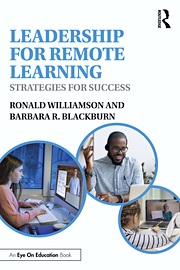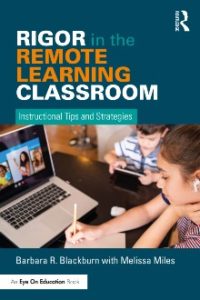10 Actions Help Navigate Challenge and Dissent
By Ronald Williamson and Barbara R. Blackburn

Ronald Williamson
Almost every aspect of our society has become politicized and that includes schools. Principals are regularly confronted by passionate parents who object to a change in policy, want curricular modifications, or offer critiques of even routine school operations.
It might be a single, highly vocal parent, subtle chatter on social media, or an organized group advocating for change but responding to public push-back has become part of the leadership job.

Barbara Blackburn
Over the past year dissent has risen, often stoked by media coverage of vaccination requirements, mask mandates, and concern about Critical Race Theory. It’s even led to statewide initiatives to dictate what can and cannot be taught, particularly in social studies classrooms.
The dilemma for principals is that there often are conflicting demands from different groups of parents and community members. Principals are often caught in the middle, and it seems as though no decision can possibly achieve a reasonable balance.
What a Leader Can Do
When faced with conflicting parental or community demands, what does a leader do? How might you respond? What longer term strategies might you adopt? Here are proven strategies that will help you lessen the impact of conflict with parent and community groups.
1. Recognize the Value of Critics
No one enjoys being criticized or having their school, or their policies, attacked. Ron worked for a superintendent who often talked about critics as “friends” – friends because they often pointed out gaps in our thinking, or provided alternatives to be considered.
Understand that the presence of critics doesn’t negate what you’ve done. But listening closely to the issues and differing points of view may offer strategies for strengthening and enhancing policy and practice.
Listening is often the most important response, especially if you are respectful and empathetic.
2. Remain Calm
Always show that you take criticism well. Don’t get emotional or angry. When a leader loses their cool, they lose control of the discussion and demonstrate lack of interest in others’ points of view.
3. Be Respectful and Courteous
It’s so very important for a leader to be respectful of all members of their school community. Even when you disagree, it’s important to carefully choose the words that frame your response, to use terms that calm rather than inflame, and to be attentive to the tone of your response. Showing courtesy and respect can be difficult when the other party doesn’t adhere to those guidelines, but it is critical for the leader to model the behavior and language that can lead to a productive discussion.
4. Engage in Skillful Listening
Listening is often the most critical skill of a leader. When conflict is present, listening can demonstrate that you take the issue seriously, that you respect the right of the person or group you’re dealing with to have opinions, and that you want to learn more about their concern and suggestions.
A challenge is that skillful listening can be misinterpreted by your critics, and they may believe that you agree with their position. That’s why it’s important to also be inquisitive and ask questions that demonstrate you are interested in learning more but will not necessarily agree with their position.
5. Be Inquisitive and Curious
Things almost always go better when a leader is recognized for their skill at open communication. Skillful listeners demonstrate a genuine interest in what the other person has to say – even your fiercest critics.
At the same time be inquisitive. Ask clarifying questions. Don’t be accusatory. When you remain open, you keep learning. Use paraphrasing to show that you are listening and understand what was said.
6. Speak Like a Real Person
A critical part of inquisitiveness and promoting further discussion is to avoid educational jargon. People don’t like “experts” who think they know more or are smarter than they are. Talk like a real person and use everyday words.
7. Dig Deeper
Always take a close look at what may be contributing to the behavior or concern. Often it’s not the issue that appears to be on the surface. We’re not suggesting deep analysis of the issues but listening for indicators of things that may contribute to the conflict, including factors outside school walls.
Critics often feel that they are not listened to and that they, or their children, are not served well. Listen for clues about people or events that may have triggered the response. Avoid emotional reactions to their responses.
Part of digging deeper is asking open-ended questions that promote discussion. Solutions emerge not from emotional responses but from information and data. One way to gather that data is to ask clarifying questions.
Never make accusations or limit conversation. Effective leaders don’t judge a person’s motives by criticizing or labeling. Instead, they ask questions and listen carefully. They also don’t lecture, threaten or use sarcasm. Rather they work to construct solutions and find ways to bridge differences.
8. Be Unfailingly Honest
During a contentious conversation don’t portray yourself as the victim. Be sure to provide honest answers. If you don’t have one or need more information, commit to getting the information that’s requested and provide an honest timeline for your response.
9. Value and Use Data
Skillful leaders recognize the importance of data for decision making. But they don’t just cite statistics or repeat talking points. They place data in context and use it to illustrate their comments and suggestions. Understand that data often doesn’t matter in emotional discussions. You probably won’t persuade your critics with data. But anchor your response in solid data about the topic and provide food for thought.
10. First, Always Focus on Students
Even though it’s last on our list here, the most important thing – regardless of the issue at hand or the behavior of the adults – is to always focus on doing what’s best for students. That must always be at the forefront of any conversation with parents or community. It seems so obvious to always think about students first, but their interests are often secondary to other agendas.
Of course “what’s best for students” is a term often used to support very divergent points of view, so it is critical that leaders be able to explain and articulate (through a student lens) the rationale for what they do, the policies they adopt, and the programs they support. Framing the issue around students and their needs is critical.
Final Thoughts
School leaders increasingly find that their role is more about community relations than instruction. When contentious and difficult issues arise, it’s important for the leader to have a clear plan of action and a set of skills to assure that their efforts calm rather than inflame, help to find resolution rather than further divisions.
We encourage the use of these 10 strategies as a way to encourage discussion and address conflict. They are all rooted in good listening, which we can think of as a readily available, low-cost and renewable resource.
Also see the Williamson/Blackburn article:
Leadership: Listening to Others in Volatile Times
References
Kouzes, J. & Posner, B. (2011). Credibility: How leaders gain and lose it, why people demand it. San Francisco: Jossey-Bass.
Williamson, R. & Blackburn, B. (2021). Leadership for remote learning: Strategies for success. New York: Routledge/Eye On Education.
Williamson, R. & Blackburn, B. (2020). 7 Strategies for improving your school. New York: Routledge/Eye On Education.
Williamson, R. & Johnson, J. H. (2012). The school leader’s guide to social media. New York: Routledge/Eye On Education.





































